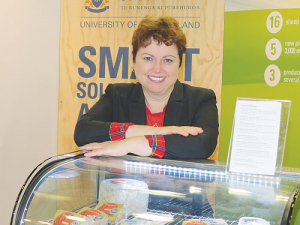Massey University's vice-chancellor Jan Thomas says she’s trying to induce a sense of innovation and entrepreneurship in the university’s graduates.
Thomas is now consulting widely on a new strategy for Massey, within the university and with industry, to ensure its graduates and researchers create economic benefits for New Zealand.
Her goal is to see industry and the university working hand-in-glove, serving the needs of the community. She wants Massey graduates to be known for their capability and desirability as employees in a world where jobs are constantly evolving.
Thomas says Massey is firmly in agri-food and agri-tech and is regarded as a world leader. “We are proud of that heritage and we intend to pursue it. The skill and capability within Massey is exceptional.”
She wants senior students at Massey to spend time in industry to help develop their entrepreneurial skills to make them desirable employees.
“I am trying to drive that sense of innovation and entrepreneurship so that our students develop capabilities and networks by which to participate in the new economies, and so that our researchers are working hand-in-glove with people in the real world solving real world problems. We want Massey seen as the go-to university if there is a challenge or a problem that needs to be fixed.”
Thomas says this requires unleashing the power of Massey University, a big part of which is working with industry. And there is the standard stuff of making sure the university’s teaching is excellent and its researchers are ranked as world class. All this, she notes, is future-proofing NZ in a rapidly changing world.
Thomas this year made her first visit to Fieldays, seeing its great networking opportunity and the innovation and technology that makes NZ a quality exporter of land based products. She says Fieldays highlighted that many people growing up in NZ don’t have a lot of experience in the modern ways of producing food and fibre.
She says debate over the use of the word ‘agriculture’ to describe the primary sector is interesting: its heritage and roots no longer reflect the future because it is now envisaged as high-tech.
“For me, the future of industries based on primary produce tend to be surrounded by high-tech, digital and so on. So we are dealing with businesses that are complex global systems.
“Many other specialists skills are required for the primary sector so we should not be limiting our horizons about that. The workforce of the future is going to look very different and we need to be attentive to that and respond to it as educators and I think the sector needs to recognise that.”
Thomas says while agri-food is often now used instead of agriculture she notes that this misses out fibre -- an issue still to be resolved.



















